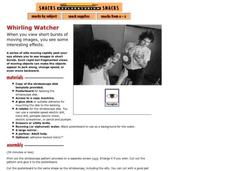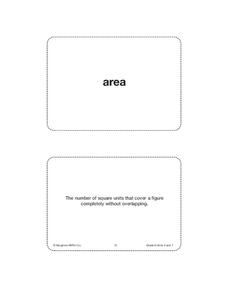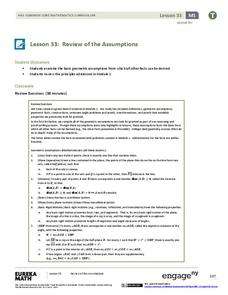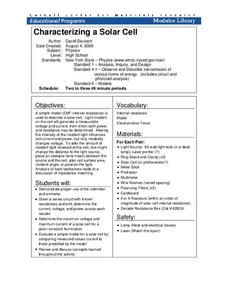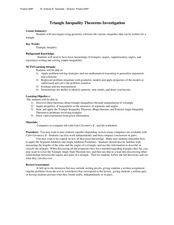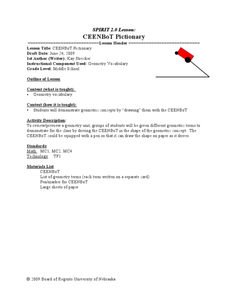Curated OER
Painting Package
Students use tools in a painting package to design tiles and create repeating patterns. They design a single tile using a 4 x 4 grid and experiment with changing the alignment of some of the tiles by rotating different areas.
Curated OER
Introduction to Polar coordinates
The class practices plotting points in a Cartesian coordinate system and a Polar coordinate system. They convert from one system to the other to get coordinates to plot. Then they play a Tic-Tac-Toe or Connect Four game to have a...
Curated OER
Tiling the Classroom
Students see how to identify regular polygons, how to slide, turn and flip polygons, and why certain polygons tessellate better than others. Groups create a one foot square design to be used to tile the classroom. Great lesson!
Ohio Department of Education
Describing and Creating Plane Figures - Grade One
Young mathematicians draw, create, and describe different shapes using triangles. They discuss attributes of the original and created shapes. Pupils classify the created shapes and draw and write in mathematics journals to communicate...
Curated OER
FACS: Exercise Physiologist
Present the exciting career of an exercise physiologist to your teens with a PowerPoint. The slide show explains what this professional does, the education required, the job atmosphere, salary range, and prospects. Finally, viewers will...
Exploratorium
Whirling Watcher
Pupils put together their own stroboscopes so that they can observe how cyclically moving images appear to merge into a singular object. This, and several other activities published by the same source, illuminate the way the brain...
EngageNY
Similarity
Learn similarity through a transformations lens! Individuals examine the effects of transformations and analyze the properties of similarity, and conclude that any image that can be created through transformations is similar. The...
Houghton Mifflin Harcourt
Unit 7 Math Vocabulary Cards (Grade 6)
Thirty-eight flashcards make up a set designed to reinforce math vocabulary. Two types of cards can be found here; a word card in bold lettering, and a corresponding definition card that offers a labeled example. Terms include area,...
EngageNY
Special Lines in Triangles (part 1)
Allow your pupils to become the mathematicians! Individuals explore the properties of a midsegment of a triangle through construction and measurement. Once they figure out the properties, learners use them to draw conclusions.
EngageNY
Review of the Assumptions (part 1)
What was the property again? Tired of hearing this from your pupils? Use this table to organize properties studied and as a reference tool for individuals. Learners apply each property in the third column of the table to ensure their...
Virginia Department of Education
Properties of Quadrilaterals
What type of quadrilateral is that? Discover the difference between the types of quadrilaterals. Small groups investigate types of quadrilaterals using geometry software to find their properties. To keep track of the different...
Virginia Department of Education
Pythagorean Theorem
Investigate the meaning of the Pythagorean Theorem through modeling. After comparing the area of the square of each side, individuals cut triangles and squares to facilitate the comparison.
101 Questions
Snail's Pace
Time doesn't fly when you're watching a snail cross a sidewalk. Combining the concepts of the Pythagorean Theorem and the distance, rate, and time formula, learners determine how long it takes a snail to go from one corner of a sidewalk...
Bowland
German or English?
Sprechen sie Deutsch? Future cryptographers must decide whether an unknown text is written in English or in German. They use provided pie charts about the frequency of words in the English and German languages to help make their decisions.
Cornell University
Characterizing a Solar Cell
Young classes are sure to get a charge out of this lesson! Learners experiment with circuits of a solar cell. They practice determining current, voltage, and power for the circuit and maximize the voltage and current of the cell.
Newseum
Evidence: Do the Facts Hold Up?
Sometimes it's hard to escape bad information! Pupils learn the E.S.C.A.P.E. method for evaluating news sources and complete a worksheet to assess a news article using their new skills.
Newseum
Can I Trust the Creators?
It's easy to find information at the click of a mouse, but is it trustworthy? Pupils learn about the E.S.C.A.P.E. acronym for evaluating sources. Next, learners read a news story and evaluate its sources to determine credibility. Last,...
Newseum
E.S.C.A.P.E. Junk News
Fair, balanced, and reputable information? There's an acronym for that! Scholars learn the E.S.C.A.P.E. method for evaluating news sources. Then, pupils work in small groups to read and analyze a news story and discuss the activity to...
Curated OER
Geometric Lines: Parallel / Transversal / Perpendicular
Students in grade 7 and 8 work on outcomes related to spatial sense and geometric concepts, properties, and relationships. The lesson integrates technology and helps students be exposed to multimedia.
Curated OER
Triangle Inequality Theorems Investigation
Students estimate and measure triangles. In this geometry lesson, students identify the relationship between three sides and a triangle. They use the inequality theorem to decide if a triangle will be formed or not.
Curated OER
Line Symmetry and Rotational Symmetry
Fifth graders investigate the symmetry of pattern block shapes. Students, working in groups determine whether each shape has line symmetry, rotational symmetry or both kinds of symmetry. Students determine how many lines of symmetry the...
Curated OER
The Laws of Sines and Cosines Made Simple!
Students study the law of sine and cosine. For this pre-calculus lesson, students create a triangle and identify the different ratios of a non-right triangle. They use the properties of sine and cosine to solve.
Curated OER
nvestigation - Justin and Daniel's Puzzles
Seventh graders explore area and perimeter, using tangram pieces. They discover the area and perimeter of rectangles and squares. After experimentation, 7th graders write a rule for finding the perimeter and area of squares and rectangles.
Curated OER
CEENBoT Pictionary
Define and review math vocabulary. Use the CEENBoT to draw pictures that represent each vocabulary word. Pupils work in groups to play math pictionary.
Other popular searches
- Special Angle Pairs
- Geometry Angle Pairs
- Smart Board Angle Pairs
- Angle Pairs Ell
- Angle Pairs in Parallel
- Geometry Using Angle Pairs
- Angle Pairs With Answer
- Geometry Angle Pairs
- Angle Pairs Homework 14.2
- Angle Pairs Homework 142
- Angle Pairs Relationships





